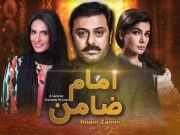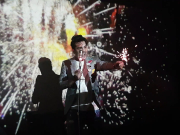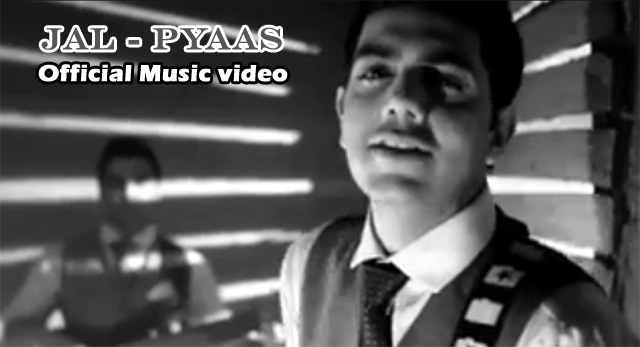I was searching about JAL Band on google when I found out a blog post with the name “Filmi Girl talks to Jal The Band”. I decided to click the link and to read the post. This was actually a complete interview of Jal the band conducted by an US based Indian Girl(i guess).She runs a blog named filmigirl.blogspot.com and reviews all the Bollywood movies time to time.
When I started reading to her meet-up with Farhan & Goher. I couldnt exit the page and keep on reading it until I finished the long post. After reading it I thought to share it with my readers too then I wrote to her to grant the permission to publish it on pakium. She was kind enough to grant permission, so right now I am publishing the complete interview by Filmi Girl (as it is). I hope you guys would like it.
———————————————————–
Since I ripped apart the 3 Idiots soundtrack – and especially that awful “rock” song – I thought I would repost my interview with awesome Pakistani rock band Jal. These guys are smart, talented, and very handsome. If they come to your town, you should definitely go check them out!
Not being Pakistani myself or even desi,I was unsure of my reception. This was, after all, the weekend that Shahrukh Khan had been held for questioning at an American airport due to his last name. Not to mention the unmanned drones the United States has been sending over the border from Afghanistan to Pakistan, the derisive nickname Afpak my government has given to their country, and a whole host of other things small and large that might make a Pakistani rock band wary of meeting with a gori amrikii.
And,indeed, when Farhan Saeed (vocals) and Goher Mumtaz (guitars) sat down to speak with me, they were very guarded. Not willing to give up the chance to really get into a nitty-gritty discussion of what it’s like being in a Pakistani rock band, I put on my game face and attempted to warm them up by speaking the universal language of bands so, what is your opinion on bass solos?I never got the hang of 6-string bas AC/DC?! Love them!Yeah, this one time I was playing a gig and .
After a few minutes, the mistrust swiftly melted away to a comfortable banter between fellow musicians. Although their accents are familiar, with softened w’s and the sweetly twisted r’s, the first thing I notice is that unlike my native Hindi-speaking friends, Urdu-speakers pepper their conversations with inshallah – if God is willing. Farhan has a warm tenor voice and speaks with soft, self-effacing tone that belies the strength of his singing.
Goher, on the other hand, has a rich baritone and puts forth his
opinions with the manner of a guy who is used to having people listen to what he is saying not that his confidence is unearned, mind you,both men were very sharp – not a whiff of the self-indulgent,lazy-minded rock star about them.
More than anything else, I was curious about the Pakistani pop scene. In India, film songs are king. In fact, non-film song albums are called “private albums”, as if to say that they are not for public consumption, just for the connoisseur. A rock band, such as we are used to here in the West, is unknown territory. In Pakistan, however, the movie industry doesn’t have such a hold on the popular culture. As Goher says, “Every child wants to be a pop star [in Pakistan] because right after cricket, pop music is the only thing that they are actually looking to [culturally]. A lot of times when we went to India, they’ve admitted that the pop scene is really strong there – in Pakistan- but the Bollywood industry, the movie industry, is really strong in India.”
And Farhan agrees. “I think he’s right, what I saw is that in Pakistan, guitar wasn’t accepted ten years back. It was more like noise to people. They were more used to piano and mainly the vocals with the music just supporting. But what happened in these 10 years is every teenager if that’s a girl or a guy, doesn’t matter – they want a guitar. So from here you can see that the people really want to come into this.
And I see Goher nodding in agreement as Farhan continues with his train of thought. “Even if he or she is not a guitar player, they start playing it and then they realize that ‘oh I’m not a guitar player, but I can strum the first notes like a bass player.” “I swallow my protestations that all bass players are failed guitarists, as Farhan is obviously getting carried away discussing the passion the Pakistani youth have for music.” I have seen so many people having private jam rooms in their houses – having a proper drum kit. This was not very common in Pakistan ten years back. They didn’t used to do that. Like [Goher] said, “Either you’re a cricketer or you’re a musician- if you’re not a normal doctor, engineer – if you want to be a star, you have to offer these two fields.”
But things aren’t quite as simple for Jal as they were for me when I played in bands. TT the Bears, the Black Cat – playing all those little pubs and clubs across America, we were more concerned about the quality of the free beer than anything else. The idea that we would not be allowed to play because we might be killed or that fans might be hurt was unthinkable and who knows if we would have had the dedication of Jal – to keep playing no matter what.
Farhan speaks to the dedication of the Pakistani artists when he talks about playing concerts. “For last few years, there was a security concern, but we’ve tried our best. We didn’t stop doing concerts; we didn’t stop performing; we went to every place in Pakistan where we could go whether it was threatening or not but we performed – so by the grace of God, it’s coming back to the track, I’m sure inshallah that it’s going to pick up.”
And this leads into something I love to ask about – the difference between crowds back home and crowds here. One thing I’ve noticed, attending concerts from South Asian artists, is that the crowds are usually all South Asian. Goher agrees but he adds that “[one of the nice things about playing here in the West] is that the Pakistanis and Indians can enjoy us together. Back in Pakistan only Pakistanis can come to enjoy and in India only Indian people can come. But here we can enjoy both kind of crowds – Indian and Pakistani.”
Art uniting two diasporas.
Farhan chimes in. “In the US, when we come, people are starving for their stars. In LA, there were 20,000 people and in Pakistan the biggest show we did was 8,000 people in Lahore. When there’s a concert every weekend and when there’s a concert every year there’s a difference. People just rush in and they want to see their stars that they’re watching on their television channels and YouTube and all. In Pakistan, they can see us anywhere. ”We’re quite local there,” Goher says with a bit of a humor in his voice. “Yeah, we’re quite local, so there’s a difference, yeah,” agrees Farhan.
In a way, it’s kind of surreal to be interviewing a Pakistani band playing to a desi crowd in the United States – the sounds of Jal are Western, as are the instruments they use, but Jal don’t play Western music. They play rock – as homegrown and authentic and as locally flavored as anything coming out of Detroit or London or Los Angeles. Says Goher, “We used to listen to a lot of bands like U2, Metallica, and stuff like that but it’s not that we’re being inspired by THEM. It’s more like we were feeling like composing something and we just sat down together.”
The sound didn’t inspire, but the idea of the rock band, a group of friends composing together appealed. “When I am playing guitar, that is automatically a Western sound – these instruments are not from Pakistan or India.” But as any musician can tell you, the people actually playing the instruments are responsible for the kind of music coming out of them. A guitar will sound slightly different depending on who is wielding the strings.
Continuing on this track, Farhan explains a bit further. “The example I’ll give is when we’ll mix and master a song, I wouldn’t compare it to any Bollywood track – I will compare it to something like Coldplay, U2, and Tool and see the sound. [Just a note from an audio nerd, he’s referring to the process when after recording a song, you play your song AND some songs of a similar sound in order to make sure that all your levels are correct. You might find, for example, that you put the guitars too loud or the vocals too soft and make the adjustments based on that – comparison track.” [FG] We [Jal] follow the music of the West but we have our own melodies. In the West, the melodies are different – the scales they use and all – it’s different. Our scales are pretty much similar to what they use in India but the instrumentation we use is what’s Western. So, that’s why we became very popular in India – it was a fresh sound for them. It was out of that orchestral thing – it was raw guitars, bass, drums, acoustic drums. I don’t see any Indians recording the live drums [by which I think he means the standard rock and jazz drum kit]. There are very few studios that record the live drums [in India.]”
Ah,but here my extensive film song knowledge comes in handy and I mention that both A.R. Rahman and the composing team Shankar-Ehsaan-Loy are known for incorporating the drum kit into their tracks. Shankar-Ehsaan-Loy also did the music for a little film about a rock band called Rock On, which became a big hit last year. (You can read my review here.) They don’t sound Western but it makes for a different sound on some Bollywood tracks. The difference in Rock On was that the songs had to be rock songs – pure rock.
Farhan says, “Yeah, Shankar-Ehsaan-Loy did a very good effort in Rock On that was a rock movie and the sound they had-Because they have thought of it to make it like that,” clarifies Goher, in case I was confused about the difference between Jal and S-E-L. -it was a conscious effort. And that’s one movie. Actually, we saw it in the heater in India and we pretty much enjoyed it – we as a band went to watch it and it was good.” I agree. Rock On was good. And it did capture the fun and the misery of being in a band- a group of people you sometimes can’t live without and sometimes can’t stand.
If rock music is a global phenomenon, what is holding Jal back from gaining a non-desi audience in the West? Japanese bands do fairly well over here, as do the more accessible French and German bands. Is the difference the stereotypical idea of South Asian music that most Westerners have? The East-West fusion that George Harrison brought back with him from his hippie-dippie days in India sounds incredibly dated to most rock listeners. What Jal offer is a different type of East-West fusion – Eastern melodies played with Western instruments and, most importantly, sung in that poetic language, Urdu.
Goher asks me, “You must have heard of Nusrat Fateh Ali Khan, right? Of course! Although I neglect to add that I mostly know him for that one song from the Aishwarya Rai-starrer Aur Pyar Ho Gaya.
“Ok, fine. When he came here and worked with one of the producers here,[the producer] had this raw material that actually he came up with and he actually kind of fused it with [Nusrat Fateh Ali Khan’s] music.”
Goher emphasizes that Jal is NOT a fusion band like this. Jal is a pure rock band and accessible to all rock fans. “The thing we are doing is more appropriate for the people living here [in the US] if they will hear it and if they will have a proper translation of what we are saying.” “Yeah, language is a big barrier,” says Farhan. “They’ll really like the melodies if they’ll be in English or something like that.”
The language issue is one that I don’t quite get because, honestly, I do like a lot of music because of the melodies. And if Sigur R’s can become popular singing in fake-Icelandic, why not a band singing in the beautiful language of Urdu? Still, I know that quite a few people like or dislike songs on the basis of lyrics and if they can’t understand the lyrics’ well, I suppose they can’t like or dislike a song. And while Jal would no doubt like a larger audience – what band wouldn’t – they are not interested in pandering to anybody.
When I ask about potential English language songs, Goher seems dismissive of the idea. “A lot of people actually tried that back home – and my opinion is that we should stick to what we are doing. If we do something in some other language and want to release that then, yes, that will be a good effort but then it has to be very nice. “The aural equivalent of Aishwarya Rai’s Pink Panther 2 is off the table completely. “I’ve heard Ali Azmat’s done an English album – the lead vocalist of Junoon – and Vital Signs, they came here six, seven years back when they were together and they actually recorded an English album there and they probably actually had the same idea [as Ali] that they should go into Hollywood or something and do something big but they recorded this album and never released it. So I think that desis are not really used to this English music. Yes, if you want to look upon a different market like USA, if you get 10 years you can target it but then those audience – Pakistani, Indians – they won’t appreciate that.” “Maybe they’ll get offended or something,” Farhan adds. “He’s right, if it has to be something, it has to be really good, so that people really appreciate it. But [that’s] why I say a whole album would be a bad idea, but to starting with a joint project [with an American band] can do it. A joint project, more than music, it says a lot – that the people from these two countries can work together. That’s the peace message from our side and a very welcoming attitude from West. So it [would] say a lot, this joint thing and as we know artists and musicians don’t have any boundaries they go all over the globe.”
So the ball is in your court, America – to take the hand of friendship offered by Jal and share in a mutual love of rocking out. But Goher has one more thing to add before I shut off my recorder. “I also want to add one thing. A lot of people have the wrong idea of Pakistan and encouraging people not to go to Pakistan and I just want to tell you that there is nothing wrong with Pakistan – we have a calm, smooth life there and we hang out together, party together, and we sing there – we perform there – and it’s only a few people who are causing problems so I hope people will carry a positive image of Pakistan.”











































